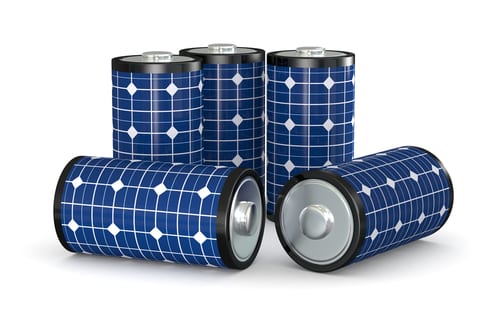A household battery is about five times the cost of an electric car battery measured in installed $/kWh.
This extra cost comes largely from balance of systems costs other than the battery. We should expect residential batteries to cost more than auto batteries into the foreseeable future. Equally, we could, should and likely will eventually see residential batteries dropping in cost the same way as auto batteries are.
Those same balance of system costs that drive prices up are the area where it’s likely big cost reductions would be available if the battery manufacturers really went for it.

Instead , the cost of household batteries has been either flat or increasing. And the Aussie dollar isn’t going to help over the next year or two.
If you looked at car batteries you’d think there was nothing but a fantastic future in front of lithium batteries. The following chart is constructed from BloombergNEF but I converted back to nominal Australian dollars instead of (un)real US dollars

The figure shows it’s the balance of system, or pack cost, that has come down the most – about 25% per year compared to the cell about 23% per year. In general very exciting reductions. A 60kWh pack for a car is A$15,000 on that basis, good for 300km at 19 kWh/100 km.
Arguably, that cost needs to halve again to get electric cars right into the mainstream, perhaps another 5 years out. But that’s not the point of this article.
Balance of system is big in utility scale batteries
Next we turn to a 60MW DC battery. The numbers are taken from an NREL article in 2018. The figure doesn’t show a time series but rather the impact of scale. The 60MW battery is show for durations of 30 minutes (30 MWh) up to 4 hours(240 MWh)

The actual battery cost doesn’t change but basically every cost comes down dramatically with scale. However, even the 4 hour battery is still more than double the cost of the car battery measured in $/kWh and that’s despite the utility battery being four times the size of the car battery.
If we compare a 1 hour duration 60 MW utility battery at A$859/kWh with an equivalent size, say Tesla, car battery at A$ 251/kWh we see a > 3X price difference.
This appears to represent mostly inverter costs: the car runs on DC but also large savings in the electrical BOS and virtually all other costs.
The car battery at US$ 176/kWh all up compares with the US$209/kWh for battery/cell/pack cost alone of the utility battery. So, 2/3 of what you pay for at utility-scale are overheads the car manufacturer avoids. However, it also probably represent a great area for cost reduction.
Like pumped hydro though, utility scale batteries probably have “every installation” is different features which may have some permanent impact on costs.
Bigger behind the meter installations
Moving further down the scale we get to larger 100 kWh up to 1 or 2 MWh behind the meter installations where the dominant player seems to be the Tesla Powerpack. Our channel checks indicate a battery cost around A$ 650/kWh and BOS around A$250/kWh
Residential batteries – yet to move
And then finally we get to the very crowded but slow-moving residential storage space. According to www.solarchoice.com.au the average price for 6-10 kWh installed battery is about $1120/kWh.
Heading over to www.solarquotes.com.au we find that the Tesla Powerwall is likely on backorder but a touch cheaper than the average quoted above, maybe and at least one newer product from a major manufacturer looks significantly better priced again. I’ll be talking to my installer about that newer product.
Residential batteries should be able to get economies of scale in the factory in the same way that auto batteries do.
So even though the absolute cost is always likely to be higher because of inverter and installation costs they both should be moving down the cost curve at a good rate. What we see though is good progress in the auto side of costs but no visible movement in the residential side.
Residential batteries, in ITK’s view, have tremendous potential to increase the resilience of the grid, provide consumers with more independence, reduce the need for distribution spending, and reduce the need for peaking generation.
Utility batteries have great opportunity in the daily arbitrage market and FCAS markets, but so do household batteries.
South Australia has a reasonably advanced scheme to support batteries, Victoria has also announced some incentives and there is a yet to be publicized interest free loan from the NSW Government. Queensland’s small offering was filled in no time.
By contrast, in the US, utility batteries will generally qualify for the Investment Tax Credit. It’s true this is due to expire over the next couple of years, but in the past we’ve seen it extended at the last minute.
Given ITK’s long held views on the fragility and vulnerability of NSW customers to a major outage at either one of the ageing NSW power stations or the transmission interconnects we think its in NSW’s self interest to get its household battery finance (interest free loan) program actually working.
And NSW could also give a bit of support to some utility batteries. You never know when a few hundred MWh might make the difference between losing an aluminium potline or not.








